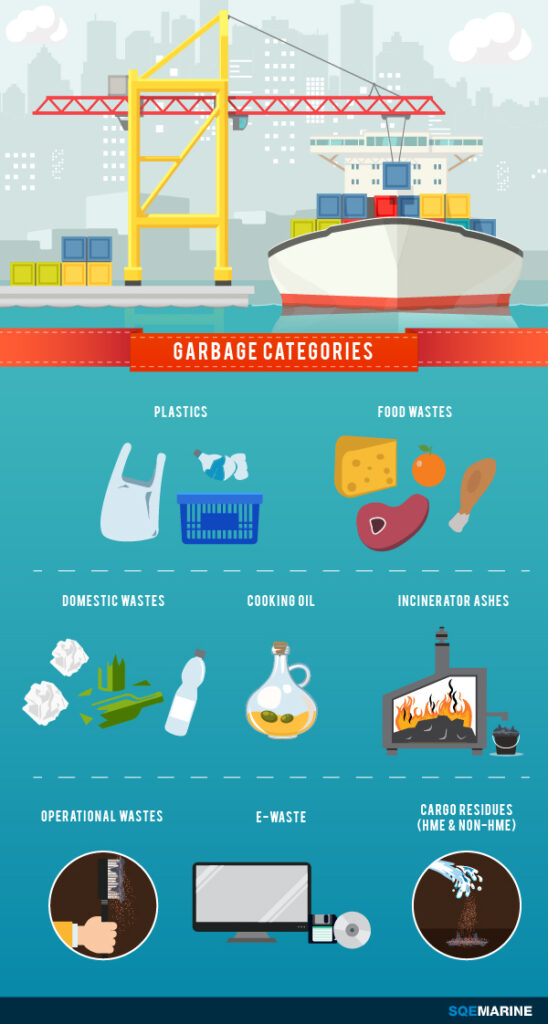A Garbage Management Plan on board provides a systematic approach to the disposal and control of garbage in the marine environment. Namely, the revised Annex V of MARPOL 73/78 requires every ship of 400 GT and above and certified to carry 15 persons or more, to have a Garbage Management Plan. Scope of this plan is to provide compliance with MARPOL and Company’s policy on garbage management.
Even though it doesn’t have to be approved or certified by a RO, a company’s Garbage Management Plan is vital onboard in order to ensure effective compliance with Annex V of MARPOL. Furthermore, this plan can assist in protecting the marine environment from garbage marine pollution and shipping organizations during PSC and other authorities’ inspection.
[smlsubform prepend=”GET THE SAFETY4SEA IN YOUR INBOX!” showname=false emailtxt=”” emailholder=”Enter your email address” showsubmit=true submittxt=”Submit” jsthanks=false thankyou=”Thank you for subscribing to our mailing list”]
The presence of this plan on board means that before, during or after a discharge operation – or incineration – crew members in charge are required to keep record in the Garbage Record Book which must be also signed by the responsible officer. This Garbage Record Book shall be kept on board ship and in such a place as to be available for inspection in a reasonable time. Authorized officers may inspect the Garbage Record Book on board any ship while is at port or offshore terminal and make a copy of any entry. Furthermore, they may require the Master of the ship to certify that the copy is a true copy of such an entry.
11 Different Garbage Categories
Garbage includes all kinds of food, domestic and operational waste excluding fresh fish and parts thereof, generated during the normal operation of the vessel and liable to be disposed continuously or periodically. More specifically:
- Plastics: Are used for a variety of marine purposes including packaging (vapour – proof barriers, bottles, containers, liners), ship construction (fibreglass and laminated structures, siding, piping, insulation, flooring, carpets, fabrics, paints and finishes, adhesives, electrical and electronic components), disposable eating utensils and cups, bags, sheeting, floats, strapping bands, rope, line and incinerator ashes from plastic products.
- Food wastes: Any spoiled or unspoiled food substances, such as fruits, vegetables, dairy products, poultry, meat products, food scraps, food particles, and all other materials contaminated by such wastes, generated aboard ship, principally in the galley or dining area.
- Domestic wastes: All types of food wastes and wastes generated in the living spaces on board the ship, that are not being covered in other waste categories such as paper products, rags, glass, metal, bottles, crockery, etc.
- Cooking Oil: Any type of eligible oil or animal fat used or intended to be used for cooking (not the food that has been prepared with these oils/fats).
- Incinerator ashes: Ash and clinkers produced from shipboard incinerators.
- Operational wastes: All solid wastes (including slurries) that are not covered by other waste category. Operational are wastes produced from cargo stowage and handling (dunnage, shoring, pallets, lining and packing materials, plywood, paper, cardboard, wire, and steel strapping) and from maintenance (collected from the engine and deck departments while maintaining the operating vessel: soot, machinery deposits, scraped paint, deck sweeping, wiping wastes, rags and oily rags etc.).
- Animal Carcasses: Bodies of any animals carried on board as cargo that die or euthanized during the voyage.
- Fishing gear: Includes any physical device placed in the water or on the sea-bed for purposes of capturing, controlling or harvesting, marine or fresh water organisms.
- E-Waste: Electronic cards, gadgets, instruments, equipment, computers, printer cartridges, etc.
- Cargo Residues (non-HME): Remaining on deck or in holds following loading or unloading of cargo or after the cleaning of the holds to be prepared for the next cargo.
- Cargo Residues (HME): The term HME refers to cargoes which under certain criteria may be classified as Harmful to the Marine Environment.
What shipping organizations should do
Further to the above, for an effective garbage management onboard, each shipping organization needs to appoint a person responsible for the implementation of the garbage management plan as well as to provide familiarization course for the crew on board and ashore, including instructions on the definitions of the incinerations or discharges by the officer in charge.
For the appropriate handling of garbage, the vessel should be equipped with incinerators, compactors, comminutors or other devices that may help at the garbage processing. Additionally a specific color code is to be included for garbage segregation on board.
There are two best practices to be followed for segregation of garbage:
- Specify the storage areas: These areas are to be identified in Garbage Management Plan and to be equipped with adequate reception/storage receptacles following the specified color code for each category.
- Waste receptacles: The garbage storage receptacles used to be adequate for the quantity of each garbage type. They should be secured in the specified storage areas, in order to be protected from pitch and roll of the vessel. They should be in a good condition for storage without any side or bottom openings.

































































